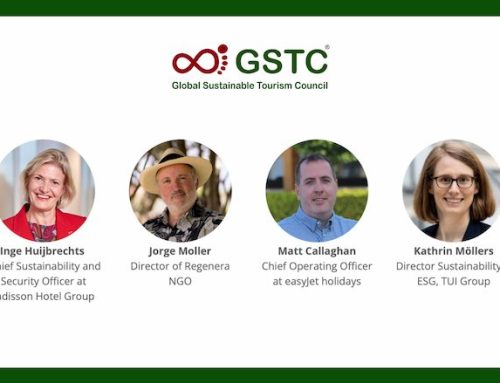Booking.com 2021 Sustainable Travel Report reveals how the ‘pandemic effect’ could finally tip sustainable travel intent into impactful action
• 83% of global travelers think sustainable travel is vital, with 61% saying the pandemic has made them want to travel more sustainably in the future
• 49% still believe that there aren’t enough sustainable travel options available, with 53% admitting they get annoyed if somewhere they are staying stops them from being sustainable, for example by not providing recycling facilities
• To help boost the visibility of more sustainable stay options, Booking.com is now showing third-party sustainability certifications and details on a range of 30+ impactful practices in place at hundreds of thousands of properties around the world

According to the findings, travelers’ day-to-day sustainable commitments are consistent with their intentions for future trips with 84% wanting to reduce general waste, 83% wanting to reduce their energy consumption (e.g. by turning off air conditioning and lights when they are not in a room) and 79% wanting to use more environmentally friendly modes of transport such as walking, cycling or public transport over taxis or rental cars. Respect for the local community is also high on the list as almost 73% want to have authentic experiences that are representative of the local culture when they travel, 84% believe increasing cultural understanding and preservation of cultural heritage is crucial and 76% want to ensure the economic impact of the industry is spread equally in all levels of society. Furthermore, 69% will go as far as avoiding popular destinations and attractions to ensure they aren’t contributing to overcrowding challenges and helping do their part to disperse the positive benefits of travel to less frequently visited destinations and communities.
Breaking down sustainable travel barriers

In terms of awareness and intentions, travelers and properties do appear to be on the same page, with new research revealing that 82% of Booking.com’s accommodation partners surveyed view sustainability in the hospitality industry as being important. This mirrors the 83% of travelers who also believe sustainable travel is an important issue. However, although 3 out of 4 accommodation partners say they have implemented sustainable steps at their property, only 31% actively communicate about their efforts proactively to potential guests, with this mostly happening at the time of check-in (59%), indicating that significant challenges remain to making sustainability information easy to access for travelers at earlier stages of the booking process.
Closing the gap, step by step
As part of Booking.com’s mission to make it easier for everyone to experience the world and as a leader in travel, the company believes they have an important responsibility to make sustainable choices easier, both for accommodation providers and travelers. That’s why the company is currently rolling out a program for properties that will support them in taking the next steps to become more sustainable, no matter where they might be on that journey. This includes sharing guidance, insights and best practices with properties via various educational opportunities, including handbooks and dedicated content, all available via the Booking.com Partner Hub.
In connection, Booking.com is currently displaying over 30 certifications officially approved by the Global Sustainable Tourism Council (GSTC)*, Green Tourism and the EU Ecolabel, as well as multiple hotel chain sustainability programs. The company is sourcing this information directly from the certification bodies and displaying it on the property pages of partners who hold one of these established third-party certifications.
To complement this, Booking.com is also encouraging its accommodation partners to update their sustainability information, which includes 32 impactful practices across five key categories: waste, energy and greenhouse gases, water, supporting local communities and protecting nature. From this global roll-out, hundreds of thousands of properties have already started to share at least some of their sustainability information with Booking.com, which can be viewed on the ‘Sustainability initiatives’ banner on each of their property pages. While it’s still early days, this is an important first step in providing more sustainability information in a transparent way to consumers, ultimately making it easier for them to start making more sustainable travel choices.
“Over the six years we’ve been conducting this research, it’s been inspiring to see awareness of the importance of sustainable travel consistently grow, both with our customers and now with our partners, too,” said Marianne Gybels, Director of Sustainability for Booking.com. “The good intentions are there on all sides, but there is still a lot of work to be done to make sustainable travel an easy choice for everyone. The more sustainable practices we can help our partners to identify and implement, the more we can experiment with how best to highlight this information to customers and ultimately make sustainability a transparent and easily identifiable part of their travel decision-making process. A small change like eliminating single-use plastics or switching to energy-efficient LED light bulbs might seem insignificant in isolation, but multiplied by millions of travelers and properties around the world, these small steps all start to add up to a much bigger potential positive impact.”
Clarification from the GSTC
Booking.com’s phrase about « over 30 certifications officially approved by the Global Sustainable Tourism Council (GSTC) » refers to accommodations certified by GSTC-Accredited Certification Bodies and accommodations certified to GSTC-Recognized Standards.
GSTC Recognition of Standards refers to the language of the standard itself. GSTC Accreditaion of Certification Bodies verifies the certification process (how an accommodation received a certification). Learn more on the difference between certification of hotels, accreditation of certification bodies, and recognition of standards.
Read the full report
Press Release: Booking.com’s 2021 Sustainable Travel Report Affirms Potential Watershed Moment for Industry and Consumers (June 3, 2021)
Booking.com 2021 Sustainable Travel Report (full report in pdf)
Don’t be left in the past, make your accommodation sustainable now
As the report suggests, travelers and fellow travel provider clients are seeking confirmation that sustainability practices are in place.
Sustainability certification for accommodations is a voluntary, third-party assessment through an audit to ensure compliance with sustainable tourism standards. GSTC does not certify directly. Certification is conducted by Certification Bodies (CB) while GSTC provides an accreditation program through its partner Assurance Services International to accredit Certification Bodies.
Accommodations certified by a GSTC-Accredited CB can use the GSTC logo along with the CB’s mark. The logos are also shared with OTAs and other buyers of hotel space.
Learn more about how to become certified as a sustainable accommodation.




